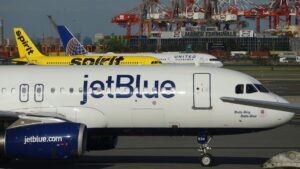At Extreme Investor Network, we strive to provide unique and valuable insights into the ever-changing world of business news. Today, we’re taking a closer look at the current state of the airline industry, specifically focusing on how low-cost carriers are adapting to new challenges.
Airlines that once eagerly awaited new jets are now reevaluating their strategies to save money and navigate the challenging landscape of the industry. Cash-strapped airlines such as Spirit Airlines, JetBlue Airways, and Frontier Airlines are deferring the delivery of new aircraft as they aim to return to profitability. This shift comes as a result of increased competition and pricing pressures, particularly in the domestic market.
Frontier Airlines, for example, recently announced that it is deferring 54 Airbus aircraft deliveries until at least 2029. This decision reflects the broader trend of airlines adjusting their growth plans in response to market conditions and supply chain disruptions.
JetBlue Airways is also taking steps to reduce costs by deferring 44 Airbus A321 aircraft deliveries through 2029. This strategic move is aimed at improving the airline’s financial outlook and optimizing its fleet operations.
Despite these changes from low-cost carriers, the overall demand for new aircraft remains strong. Both Airbus and Boeing are facing challenges in increasing their production output due to skilled worker shortages and supply chain disruptions. With a backlog of unfilled orders, airlines are feeling the strain of delayed deliveries and are adjusting their growth plans accordingly.
At Extreme Investor Network, we understand the complexities of the airline industry and provide in-depth analysis to help our readers navigate these turbulent times. Stay tuned for more updates and insights on the latest developments in the business world.

